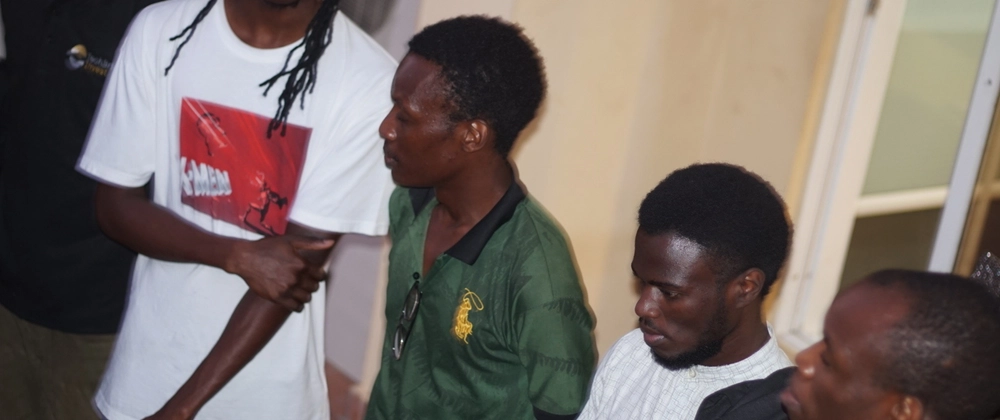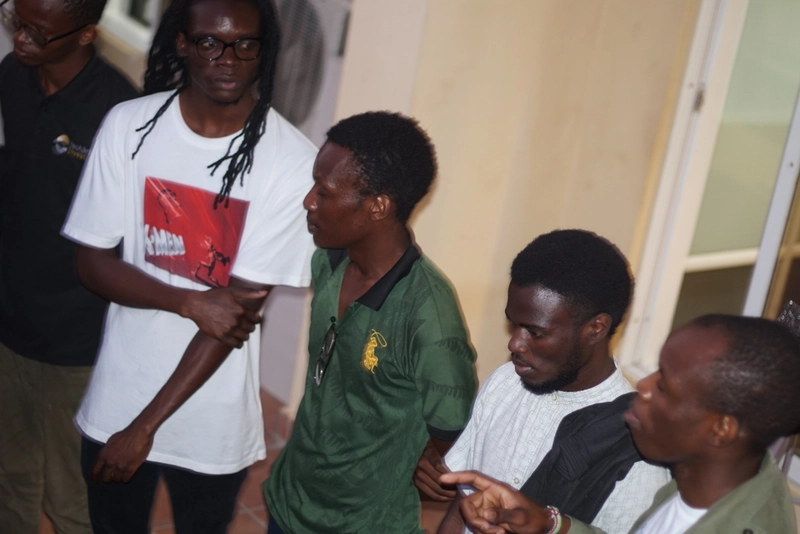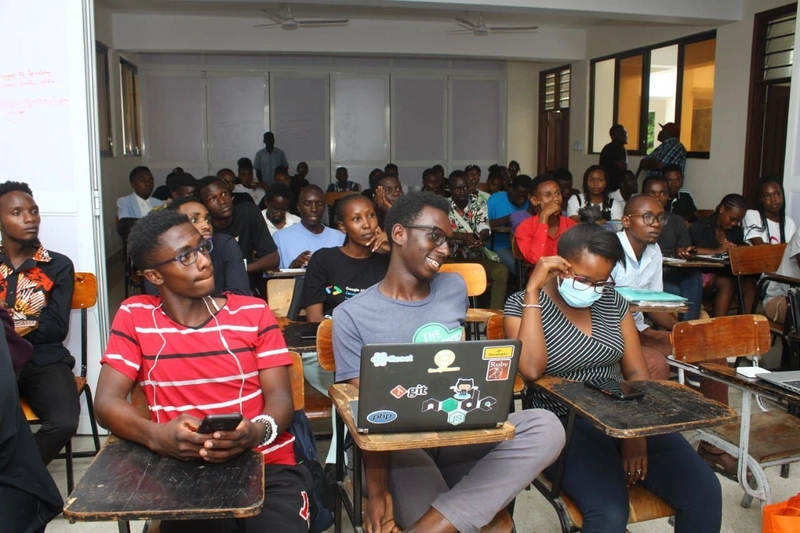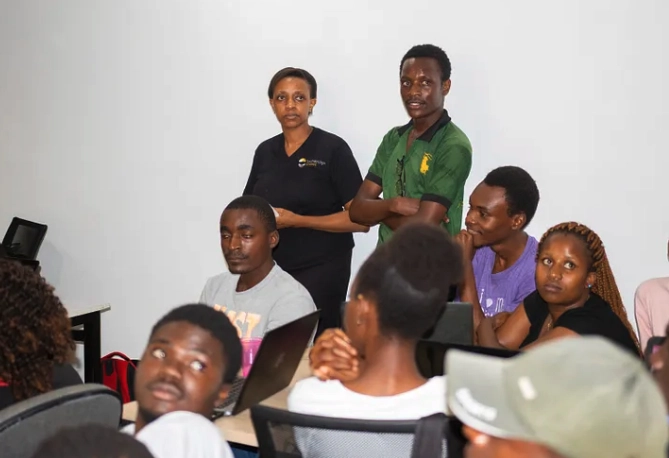We weren't experienced. Not in community building, not in development. We were just three friends in Mombasa who refused to keep watching from the outside. Everyone we saw doing something in tech belonged to communities we had no access to. Most of the stories we admired came from Nairobi or global circles that felt too far removed from where we were. We were never part of any of that. We didn't get handpicked, we weren't funded, and we didn't even know how things were "supposed" to be done. But we kept seeing what other communities were doing, and something in us said we could do this too. Maybe not bigger, maybe not better, but definitely in our way.
OnlyDevs started with a few more people, but the rest left soon after the idea came up. They liked the sound of it but didn't stick around to build it. It was just the three of us in the end. We didn't even plan much at first. We just said, "Let's do this together instead of alone." And that was it. That's how it started. No structure. No roles. No fancy goals. We were tired of being on the sidelines.
The Early Days
In the early days, I gave everything I had. I stayed up late preparing decks, customizing event platforms, building tools to help us track members, and reaching out to sponsors who mostly ghosted me. I ran the community like a second job but without a paycheck. I did it because I believed in the mission.
We didn't have sponsorships or gear or anything that made us look like a serious group. But we showed up. We found free venues, sometimes begged for space, pulled in speakers, and printed posters from our own pockets. We hosted our events and taught ourselves how to run them on the go. We were building everything from scratch and learning through mistakes.
We poured ourselves into it. After classes. After work. After everything else. We made our own posters, used our own data, and transport money. There were days we didn't know if even five people would show up, but we kept showing up anyway. Because what we were doing felt important.
But even in the mess, people came. Not for the hype, not for the swag, but because they felt something genuine. You could walk into an OnlyDevs event and feel seen. We remembered names. We stayed after the events, talking for hours. We didn't have anything shiny to give, but we gave our time, effort, and presence.
The Impact That Matters
Over time, we started seeing people grow. One guy landed his first internship because of an event we organized. Others went on to lead in their ways. A girl who once sat quietly at the back of one of our sessions is now a full-time developer in Nairobi. Recently, someone stopped me and said, "If it weren't for OnlyDevs, I wouldn't be here." Those moments carry weight. They're reminders that it wasn't all in vain. And that hit me because back then, we didn't know what we were doing, but we knew why we were doing it. And maybe that's exactly why it worked, even if just for a while.
The Hard Truths
Because here's what I learned the hard way: most people don't join communities to build. They come to benefit. They come to take. They're not bad people, just pragmatic. You offer something for free, and they take it. They get what they need, maybe a job referral, a connection, or a spotlight - and then they leave. No goodbye, no thanks, no trace of the hundreds of hours you poured into making that moment possible. It's transactional. You are useful until you're not.
What makes it even harder is when you start seeing others monetize what you built for free. You see people, some of whom grew up in your community, create spin-off brands, monetize events, or land sponsorships using the same concepts you pioneered. No credit, no acknowledgment, just appropriation. And you're left wondering if maybe you gave away too much, too freely.
There were times I would host events and see people attend, then run off and recreate the same format, same guests, same structure, and same resources, but now behind a paywall. It stings. Not because you want control, but because it's a reminder that what you spent months building could be copied in a day. And it's not just the event formats. I've seen people repurpose the same code, the same learning paths, and even the same promotional material and position it as original. And while they rise, you're left patching together the next free thing to give away.
And the emotional toll?
That's something no one quantifies. You build relationships, only to feel used. You watch people you believed in vanish without a trace. You invest emotionally in strangers, hoping that they'll stick around, that they'll give back, that they'll help the next person the way you helped them. Most of the time, they don't. The few who stay? They become your anchors. You treasure them, but they're the exception, not the rule.
The Bigger Wave
Eventually, the wave came. Sponsored communities started popping up everywhere. Not just in Nairobi anymore, but even across Kenya. They were strong. Not because they were bad or fake. No. They had resources. Funding. Support. Consistency. They brought in big names, hosted big events, gave out t-shirts and stickers, and everything else we never had. It wasn't a competition; it was just overwhelming. Their wave was too strong. They created something real, too, but different. They had structure. We had a soul. And maybe that's where the difference lies.
For a while, it seemed like we were living in the shadow of these larger, more structured communities. And truthfully, it was hard to compete. But even more difficult than that was the realization that the deeper, more personal connections we had built were starting to fade. With the big events, the sponsorships, and the flashy giveaways, the focus shifted away from the people. The intimacy we once had began to feel lost.
The connection changes. The feel changes. What we had was handcrafted and human. What came after felt more like a system, smooth and impressive, but distant. We weren't part of that machine. We were three tired friends holding something fragile with our bare hands.
In those sponsored communities, the events became bigger, but the connections became fewer. The systems got smoother, but the individuals felt harder to reach. What we had was more intimate, more personal. But intimacy requires energy. Constant effort. And we were tired. We had our own lives, jobs, and responsibilities. We were never full-time community managers. We just wanted people to have a place to grow together. But over time, giving got harder. Showing up started to feel heavy.
The Silent End
And then, slowly, we stopped.
OnlyDevs didn't end with a statement or announcement. No shutdown tweet. No "thank you for everything" post. It just faded. One event got postponed and then canceled. We stopped replying. Group chats slowed down. The email list gathered dust. The silence grew. And that was it. No one came to take over. No one reached out to revive it. Maybe people assumed we were fine, or that we had moved on to better things. But the truth is, we just couldn't carry it anymore. And no one else offered to carry it with us.
Looking back, I don't think OnlyDevs failed because of competition. It failed because of us. We gave up. Not because we wanted to, but because we were stretched thin and couldn't give what we used to. That's the brutal part. Sometimes, things don't die because they don't matter; they die because the people holding them just get tired. And when no one is willing to step in, the thing you love starts slipping away. We kept hoping someone would take it on, but no one ever did.
I think about that a lot. About how things die quietly when no one cares enough to fix them. About how the people who benefit from a space don't always see what it costs to keep it alive. And about how we don't talk enough about that part. We all love communities when they're vibrant and full. But when they start to break, who's there patching the cracks? We weren't trained for any of this. We didn't even know what we were getting into. But we gave it heart. And when the heart runs out, what's left?
The Lesson
This isn't a call for pity. This isn't bitterness. This is clarity. This is what it really looks like to build a community, not the PR version, not the influencer version, not the sponsored panel version. This is what it's like to build from nothing, to build while everyone is watching and taking not helping.
The culture of community participation has become transactional. Globally, and especially here in Kenya, we've glamorized the idea of community so much that no one talks about what it takes to sustain one. We celebrate the events, the photos, and the vibes, but behind every successful session are tired organizers, often broke, overworked, and wondering if anyone really cares.
The developer ecosystem in Kenya is still young. The coast, especially, is often overlooked. If we don't build our systems, no one will do it for us. But if we're building, let's talk honestly. Let's admit that it's hard, that it's unfair sometimes, that people can be selfish, and that good intentions alone won't save you.
So here's the lesson, the one that still stings when I think about it: building a community is hard. It's about more than passion. It's about resilience, consistency, and the ability to adapt when things get tough. And when you build something from the ground up, you have to know that it won't last forever unless you have people committed to keeping it alive when you can't. That's the brutal truth. And that's what OnlyDevs taught me.
What Remains
Still, I don't regret it. If anything, I'm proud of what we tried. We didn't have much. We had an intention. We had each other. And for a moment, we made something real. Something people still remember. Something people still thank us for. That matters more than any funding or event count.
It's easy to forget the builders when the building crumbles. But we were there. We showed up. We tried. Sometimes that is all you have.
Even if your community doesn't scale, your impact does. People still carry it in how they show up in other spaces, in how they think, and in what they build next.
So, if you're part of a community today, ask yourself who's building it. Who's holding it up when no one's watching? And if you've ever benefited from one, maybe it's time to stop just attending and start giving back. Because the truth is, these spaces don't survive on hype. They survive on people who care enough to keep them alive even when it's hard.
We didn't build OnlyDevs because we were experts. We built it because we were alone, and we didn't want to be anymore. That was it. We refused to wait for someone else to create the space we needed. And even though it ended, I'd do it all again. Not because it worked forever, but because, for a while, it mattered.
OnlyDevs wasn't part of any major ecosystem. We weren't trained, funded, or recognized. But we were present. And we mattered, even if only for a moment.
We built something real.
Not perfect. Not polished. Just real is enough.








Top comments (3)
❤️
This is the most beautifully written article I have ever read...trust your efforts are being seen!!!!!
Thank you